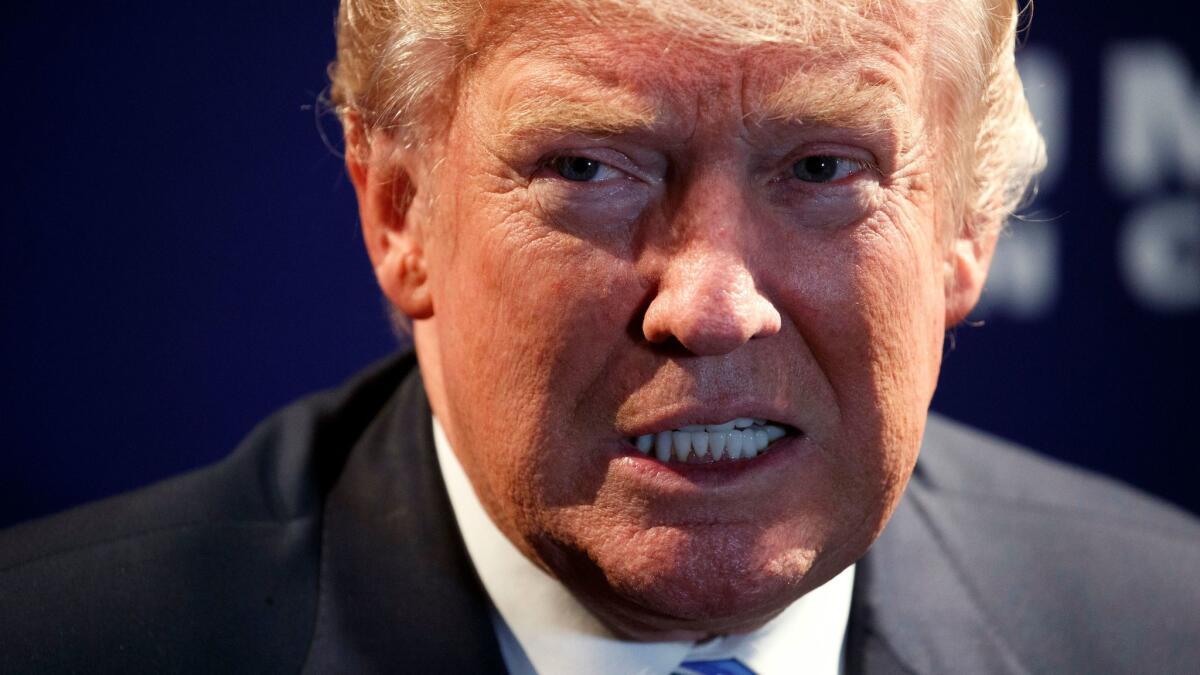That time Donald Trump got sued by a California men’s rights activist

It had to be one of the most unusual lawsuits Donald Trump was ever involved with: One of his businesses was accused of being sexist. Against men. For promoting breast cancer awareness.
The saga started when an Orange County man named Steve Frye noticed in October 2010 that Trump’s golf course in Rancho Palos Verdes was offering 25% off to “ladies” for breast cancer awareness month.
“From pink golf tees to pink-ribbon headwear and ball markers wherein a portion of their sales supports breast cancer research, we would like all of our golfers to remember the significance of this month,” the Trump National Golf Club promotion said.
Frye had a problem with women paying less. He sued Trump’s golf course for discrimination in 2011.
“Providing discounted green fees to only female patrons is as offensive, archaic and unlawful as giving discounted green fees to only male patrons, or charging people of color more than Caucasians for green fees, or charging homosexuals more than heterosexuals for green fees,” Frye said in his class-action lawsuit in Los Angeles County Superior Court.
Frye was not some teed-off golfer. He is a self-described men’s rights activist who has sued dozens of California businesses over the years for having “ladies’ night” specials, or deals that specifically benefit women.
Across the nation, men’s rights activists have battled feminists, media outlets and other institutions for perceived sexism against men, often drawing accusations of misogyny in return.
They frequently take to the courts in California, where “ladies’ night” specials have been illegal since 1985, when the state’s Supreme Court ruled that such deals violated state civil rights law requiring businesses to “provide equal advantages and privileges to all customers no matter what their sex.”
Citing California’s Unruh Civil Rights Act, which was designed to protect minorities and women, men’s rights activists have filed scores of lawsuits challenging women’s networking events, car washes, bars, professional sports teams and other businesses for allegations of discrimination against men.
For more on the presidential campaign »
Many of Frye’s lawsuits challenged California golf courses who charged men more than women “in violation of California public policy,” Frye said in a deposition, adding that he settled about half the cases and won money in some of them. (In one of his highest-profile cases, Frye sued Playboy for a “Leather and Lace” party at Playboy Mansion where men were charged $1,000 to enter but some women were let in free. In a connected lawsuit, Playboy claimed the prices were actually set by a promoter, and Frye’s case didn’t reach trial.)
Frye, who could not be reached for comment, has been listed as a member of the National Coalition for Men, a San Diego-based 501(c)(3) nonprofit whose members have been prominently involved in “ladies’ night” lawsuits.
The group’s Facebook page closely monitors high-profile rape cases and recently complained that the movie “Sully” did not depict women and children exiting a crashed airplane before men — arguing that the omission was a feminist plot to hide male victimization.
“Most people simply don’t believe it happens, that men aren’t discriminated against at all.… It’s nuts. We’re disadvantaged in almost every way,” the group’s president, Harry Crouch, said in a telephone interview, adding that the group had once complained about a PGA tournament’s “women’s day.” “How would you feel if that golf tournament instead said ‘whites only, no blacks allowed’?”
Ironically, Frye’s lawsuit against Trump’s Rancho Palos Verdes golf course came at the same time that golf course employees, in a separate lawsuit, were accusing Trump of wanting to fire unattractive women.
It fell to Trump National’s attorney, Jill Martin, to argue why the golf course’s breast cancer promotion wasn’t discriminatory against men.
In a motion to dismiss Frye’s lawsuit, Martin argued that the 25% discount pursued “two important public policies: raising awareness for breast cancer and encouraging women to play golf.”
Breast cancer disproportionately affects women, and “discrimination in golf may also stifle a woman’s potential for career advancement” because corporate employees often network on the golf course, Martin said. (Martin also argued that Frye had paid to play on the golf course after the promotion had expired, making him ineligible to sue.)
A judge agreed and threw out Frye’s case before it reached trial, writing that the promotion didn’t “perpetuate any kind of stereotype, but rather supported public awareness of breast cancer.”
Ultimately, Trump’s golf course defeated the men’s rights advocate. An appellate court agreed and denied Frye’s appeal, and the state Supreme Court declined to hear Frye’s appeal.
Email: matt.pearce@latimes.com
Follow me on Twitter: @mattdpearce
ALSO:
Trump wanted to fire women who weren’t pretty enough, say employees at his California golf club
Parents complain to FCC about airing of vulgar Trump recording and threaten to sue CNN
Live coverage from the campaign trail
More to Read
Get the L.A. Times Politics newsletter
Deeply reported insights into legislation, politics and policy from Sacramento, Washington and beyond. In your inbox three times per week.
You may occasionally receive promotional content from the Los Angeles Times.











